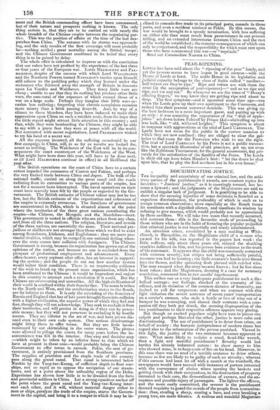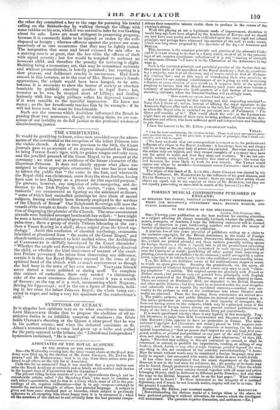DISCRIMINATING JUSTICE.
THE inequality and uncertainty of our criminal law, and the arbi- trary nature of the punishments it awards, are constant topics for invective : " Justices' justice," as it is sneeringly termed, has be- come a byword ; and the judgments of the Magistrates are said to exhibit a singular lack of judgment. It is gratifying to be able to show that the seeming injustice of some decisions is founded on a sagacious discrimination, the profundity of which is such as to escape common observation ; more especially as the Bench treats its assailants with a dignified silence, and manifests its wisdom by refusing to give reasons, which would probably not be appreciated by these cavillers. We will take two eases that recently occurred, and contrast them : this is the favourite mode of proceeding by those writers who are in the habit of fostering the popular prejudice that criminal justice is not impartially and wisely administered.
An atrocious crime, committed by a man residing at Whit- church, in Shropshire, on the illegitimate child of a woman who passed for his wife, was reported in the papers last week : the little sufferer, only about three years old, related the shocking cruelties inflicted on him, and his person bore evidence to the truth of his statement. It appears that the child was constantly corrected with extreme severity, but stripes not being sufficiently painful, recourse was had to burning ; the little creature's hands were thrust into the flames, and the quivering flesh pierced with red-hot wire_ The man escaped when the story became known ; but he has since been taken ; and the Magistrates, deeming it a case for summary conviction, sentenced him to two months' imprisonment. This strikes one as a very inadequate punishment for such a dia- bolical outrage ; our feelings, shocked at the enormity of the offence, and its violation of the common dictates of humanity, are incited to call for vengeance: and when we contrast with this light visitation the severe sentence of seven years transportation on a carrier's carman, who stole a bottle or two of wine out of a hamper he was conveying, and shared their contents with a com- panion till they both got drunk, the seeming disproportion of the two punishments to their respective offences appears very glaring.
But though an excited populace might have torn to pieces one culprit and perhaps liberated the other, justice is more calm and discriminating. The use of punishment is to deter from crime, on behalf of society : the humane jurisprudence of modern times has regard also to the reformation of the person punished. Viewed in this light, the justice of the two sentences becomes apparent at once. What more likely to reclaim a cruel, fiend-like wretch, than a light and merciful punishment ? Severity would but harden his already indurated nature : to show mercy to him who showed none, is to heap coals of fire on his head. Moreover, in this case there was no need of a terrible sentence to deter others, because so few are likely to be guilty of such an atrocity ; whereas if this carman had been let off with a month at the treadmill, the newspapers would have teemed with instances of porters intrusted with the conveyance of choice wines opening the baskets and getting drunk with their companions, to the destruction of property intrusted to their care, the demoralization of carmen, and the an- noyance and possible injury of passengers. The lighter the offence, and the more easily committed, the severer is the punishment deemed requisite to guard the morals of the people from contamina- tion : thus, stealing a sheep, snaring a hare, and even breaking a young tree, are made felonies. A zealous and watchful Magistrate the other day committed a boy to the cage for pursuing his lawful calling on the Sabbathnday by walking through the village with some rabbits on his arm, which it was natural to infer he was hawking about for sale. Laws are most stringent in preserving property, because it is constantly liable to be injured or stolen by the evil- disposed or hungry ; whereas offences against the person are com- paratively of so rare occurrence that they may be lightly visited. The temptation that meat and bread exposed for sale offer to a starving man is so great, that the law visits the offence of theft with signal severity ; but few would be tempted to maltreat an innocent child, and therefore the penalty for torturing is slight. Stabbing being a momentary act, that may be committed suddenly and without premeditation, is heavily punished ; but roasting is a slow process, and deliberate cruelty is uncommon. Had death ensued in this instance, as in the case of Mrs. BROWNRIGG'S female apprentices, the culprit would have been hanged, to be sure, because it is necessary to show the horror of society at absolute homicide by publicly enacting another in legal form : but, monster as he was, he stopped short of killing ; and dealing leniently with him might perhaps soften his depraved nature— if it were sensible to the merciful impression. He knew not mercy ; so the law beneficently teaches him by its example : if he will not learn now, he must be irreclaimable.
Such are the reasons which doubtless influenced the Bench in passing these two sentences ; though in stating them, we are con- scious of our inability to do full justice to the profound wisdom of discriminating justice.



























 Previous page
Previous page